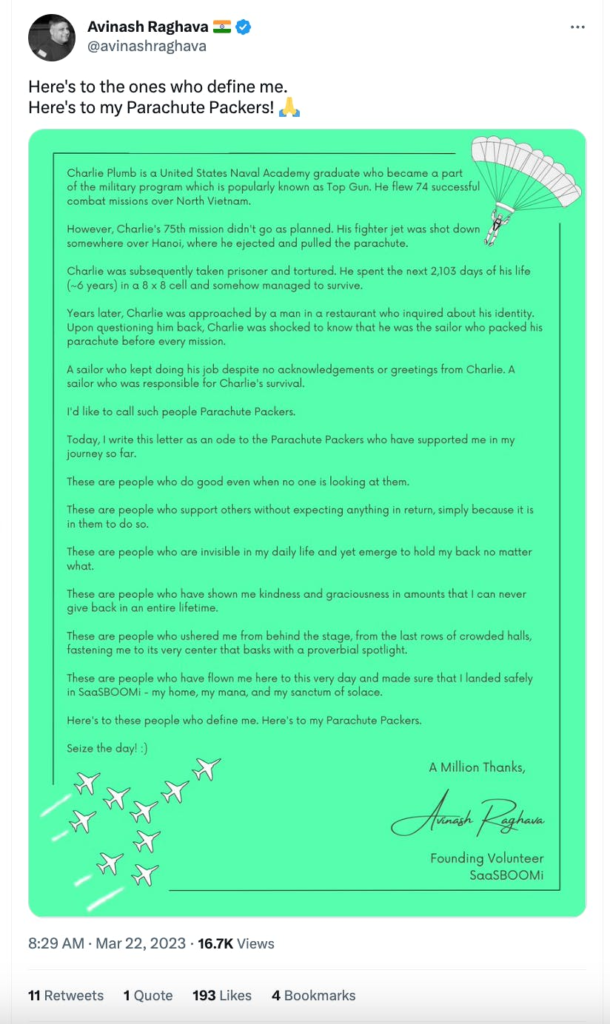Why to read fiction
Welcome to the eighth edition of ‘3-2-1 by Story Rules‘.
A newsletter recommending good examples of storytelling across:
• 3 tweets
• 2 articles, ana
• 1 long-form content piece
Each would be accompanied by my short summary/take and sometimes with an insightful extract.
Let’s dive in.
🐦 3 Tweets of the week

Great news for the planet, delivered through simple use of charts and a clear message at the top.

Such a lovely analogy-story to illustrate the importance of the silent army that supports each of us.

A crucial pre-requisite for a good review meeting is to ditch the blame-finding mindset and replace it with a curious root-cause finding mindset.
📄 2 Articles of the week
a. The Pornography of Genre, or the Genre of Pornography by Neil Gaiman
The bestselling and critically-acclaimed author Neil Gaiman makes this lovely case for how much our imagination helps us enjoy fiction:
The miracle of prose is this: it begins with the words. What we, as authors, give to the reader isn’t the story. We don’t give them the people or the places or the emotions. What we give the reader is a raw code, a rough pattern, loose architectural plans that they use to build the book themselves. No two readers can or will ever read the same book, because the reader builds the book in collaboration with the author. I don’t know if any of you have ever had the experience of returning to a beloved childhood book. A book that you remember a scene from so vividly, something that was etched onto the back of your eyeballs when you read it, and you remember the rain whipping down, you remember the way the trees blew in the wind, you remember the whinnies and the stamps of the horses as they fled through the forest to the castle, and the jangle of the bits, and every noise. And you go back and you read that book as an adult and you discover a sentence that says something like, “‘What a jolly awful night this would be,’ he said as they rode their horses through the forest. ‘I hope we get there soon,’” and you realize you did it all. You built it. You made it.
Also, this anecdote – about how the Chinese realised the power of science fiction – blew me away:
A few years ago, in 2007, I went to China for the first-ever, I believe, state-sponsored science fiction convention, and at some point I remember talking to a party official who was there and I said, “Up until now I have read in Locus that your lot disapprove of science fiction and you disapprove of science fiction conventions and these things have not been considerably encouraged. What’s changed? Why did you permit this thing? Why are we here?” And he said, “Oh, you know for years we’ve been making wonderful things. We make your iPods. We make phones. We make them better than anybody else, but we don’t come up with any of these ideas. You bring us things and then we make them. So we went on a tour of America talking to people at Microsoft, at Google, at Apple, and we asked them a lot of questions about themselves, just the people working there. And we discovered that they all read science fiction when they were teenagers. So we think maybe it’s a good thing.”
Hat-tip: I came across this article from a vibrant writing community I’m part of called the Clear Writing Community. To join, you need to take up Amit Varma’s Art of Clear Writing course.
b. All Together Now by Morgan Housel
Morgan shares a compelling set of stories about the panic-inducing power of crowds.
Controlling your behavior amid uncertainty can be hard enough. Controlling your reactions to other people’s behavior is way harder. Fear is more contagious than any virus, and can instantly push people to react in ways that would have seemed unthinkable a moment prior.
…
Some people are more impressionable than others. But everyone is a product of the experiences they’ve had, the people they’ve met, the people they’ve observed, the people they’ve read about, and the people around them at any given moment who are shaping their behaviors in good, bad, and ugly ways. That alone explains so much wild behavior in the world.
🎤 1 long-form listen of the week
Nitin Pai is among the foremost thinkers and storytellers in the domain of public policy, foreign policy and strategic affairs. In this mammoth five-and-a-half hour conversation, Amit and Nitin dive into several aspects of India’s history and current affairs. They discuss the constitution (just listening to the discussion on the preamble is worth the time spent on the podcast), foreign policy, public governance and even hot-button issues like Kashmir. Listen to the last portion just to learn how to disagree and debate with vigour but also respect.
That’s all from this week’s edition.
Photo by Pierre Bamin on Unsplash








